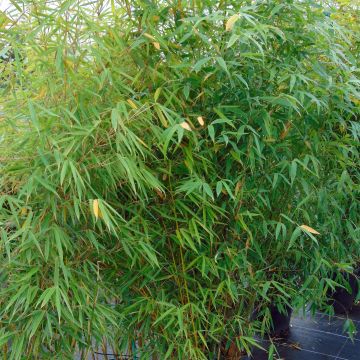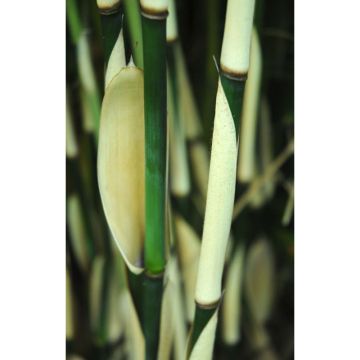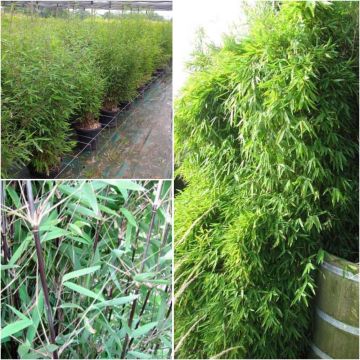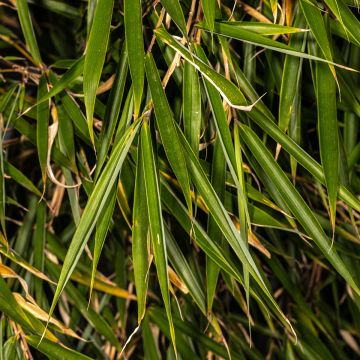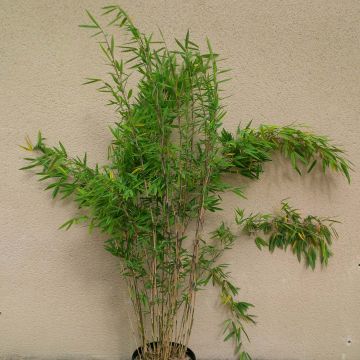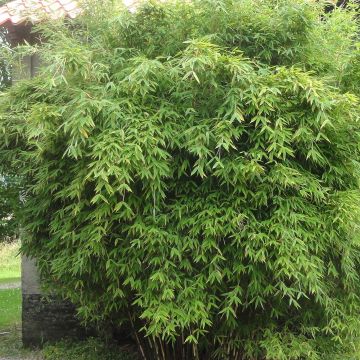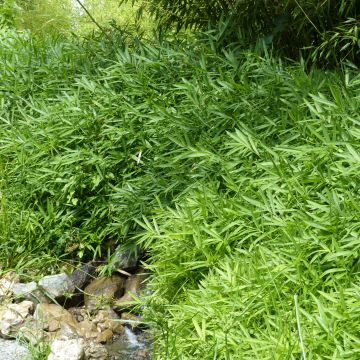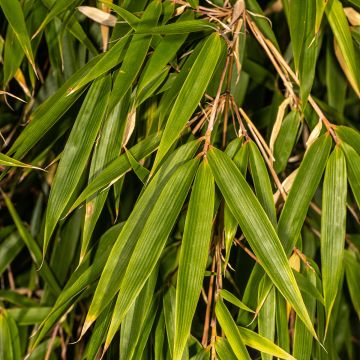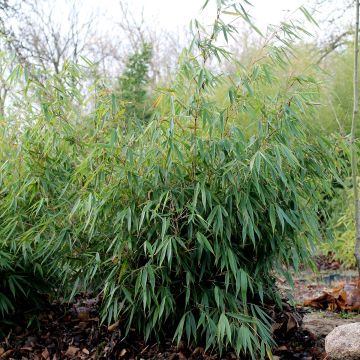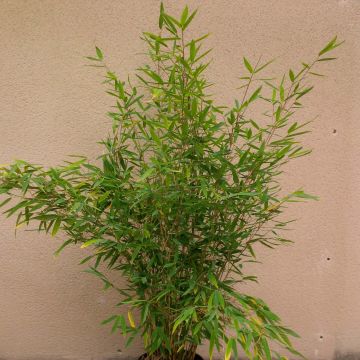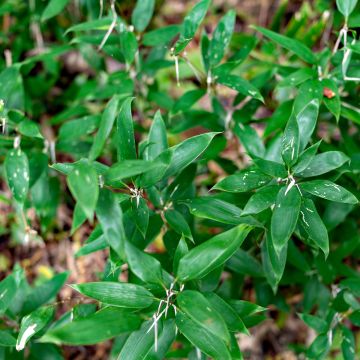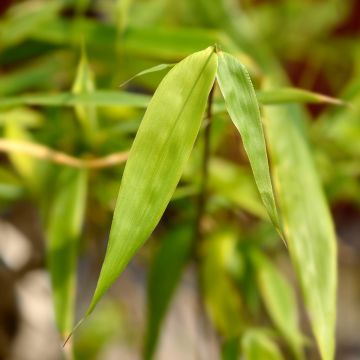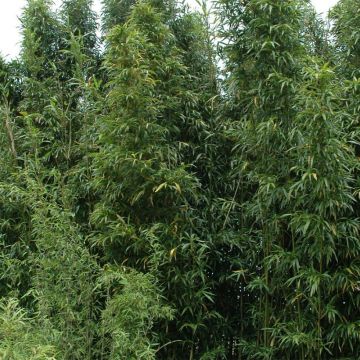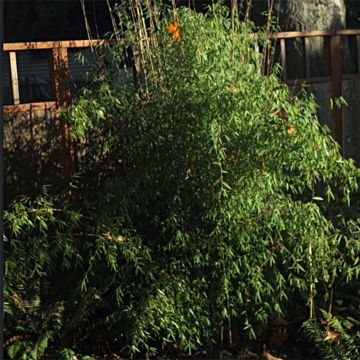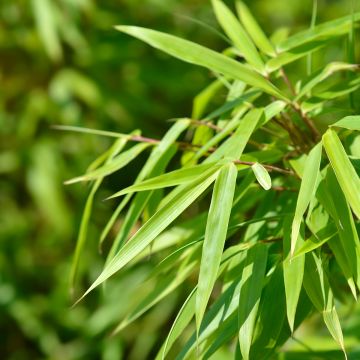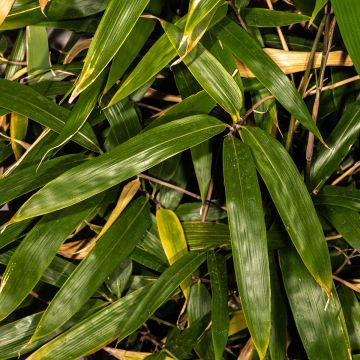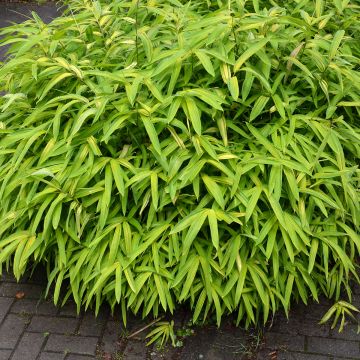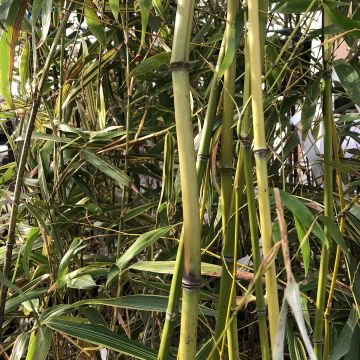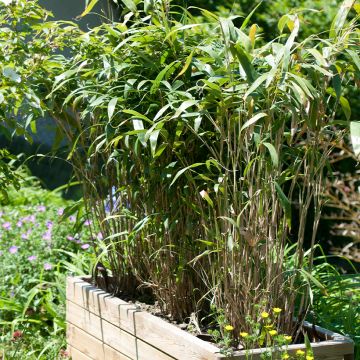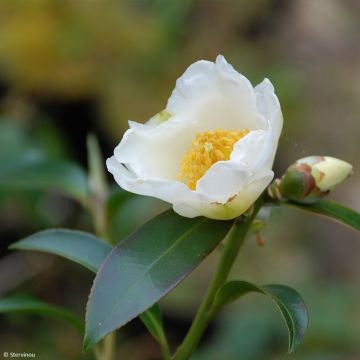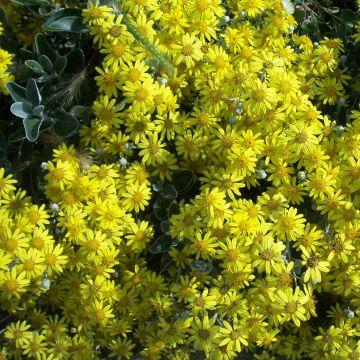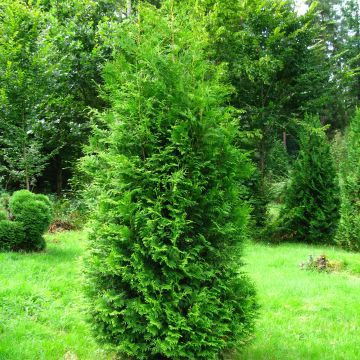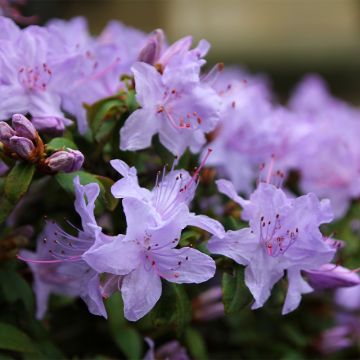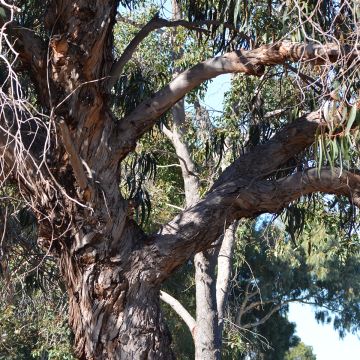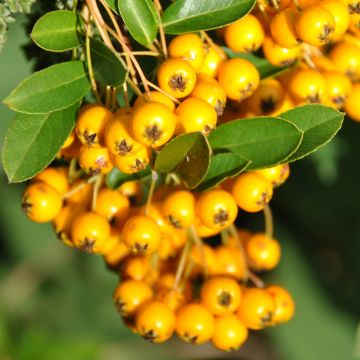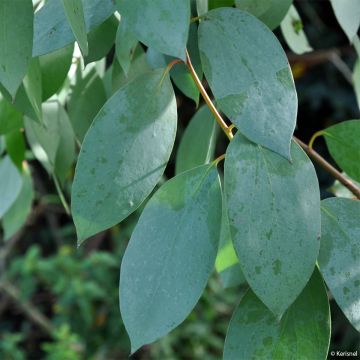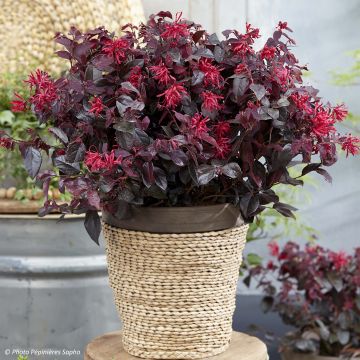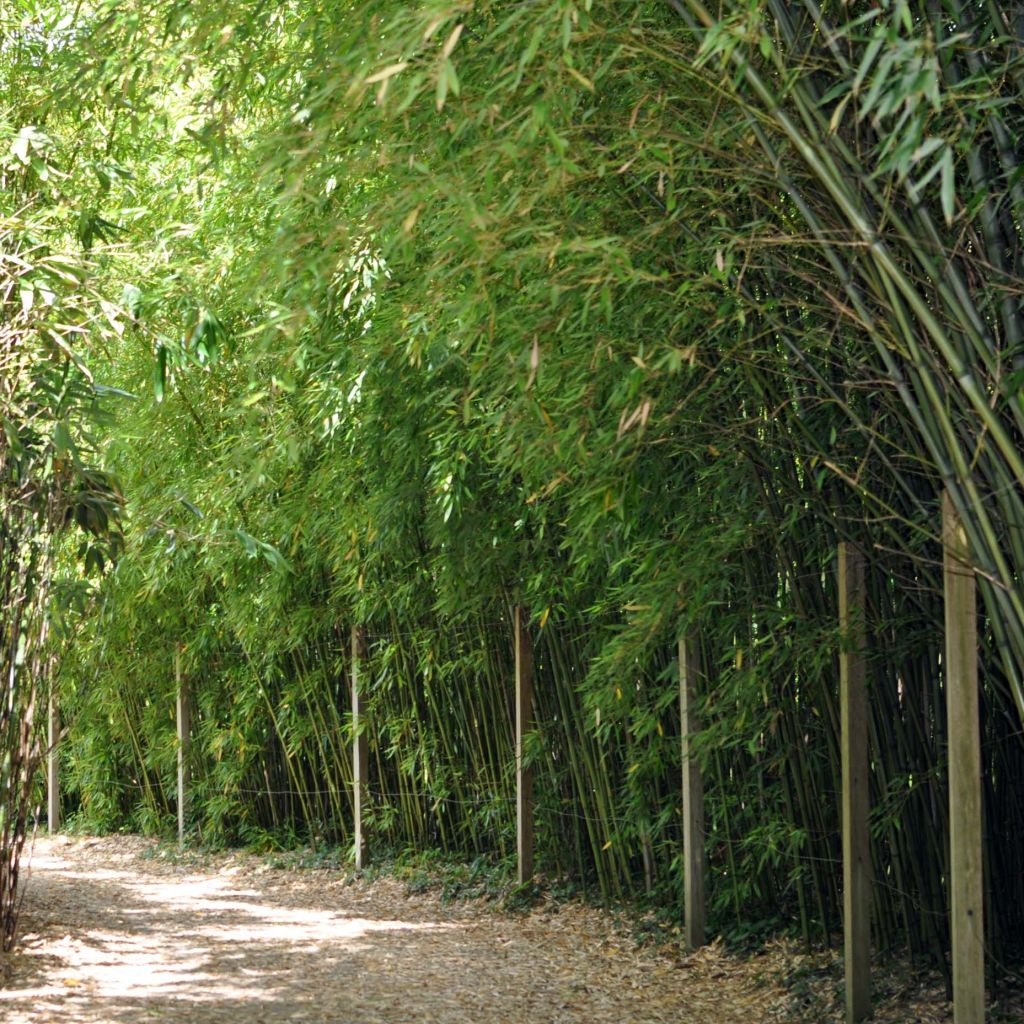

Pleioblastus chino - Dwarf Bamboo
Pleioblastus chino - Dwarf Bamboo
Pleioblastus chino
Dwarf Bamboo, Chino Bamboo
Why not try an alternative variety in stock?
View all →This plant carries a 24 months recovery warranty
More information
We guarantee the quality of our plants for a full growing cycle, and will replace at our expense any plant that fails to recover under normal climatic and planting conditions.
From €5.90 for pickup delivery and €6.90 for home delivery
Express home delivery from €8.90.
Does this plant fit my garden?
Set up your Plantfit profile →
Description
Pleioblastus chino is a hardy bamboo, perfectly adapted to harsh climates. Very evergreen and remarkably dense, it is covered with intense green foliage on more or less purple canes. The creeping rhizomes prove to be extremely efficient in creating a medium-sized hedge or stabilizing rocky slopes and embankments, even on a steep slope. Perfectly tolerant of pruning, this bamboo will also appeal to topiary enthusiasts.
The silhouette of Pleioblastus chino is very dense, compact and densely branched upwards. Perfectly suited to harsh winters, this medium-sized bamboo is native to northern Japan and belongs to the grass family Poaceae. It has solid canes, with a diameter of 2 cm (1in), which reach up to 3 or 4 m. Depending on their exposure, canes will be more or less tinged with purple on a green background. With fairly rapid growth, it spreads through its very travelling rhizomes over large areas and forms a beautiful rounded, bristling and dense bushy mass. Its perfectly evergreen foliage consists of long, fairly thin, beautifully vibrant, green leaves.
Perfectly hardy and very vigorous, Pleioblastus chino thrives so well in deep and moist soil, that it can become invasive. To contain its growth, we recommend giving it a large, unattractive embankment or using a bamboo root barrier. Hardy in all situations, it suits Zen, wild, exotic or contemporary gardens. Tolerating full sun well, it can be used to stabilize a slope or to surround a water feature. It can also create very beautiful evergreen hedges, for example along a path in a large garden or to define a property. This bamboo responds very well to pruning, it will adapt to the whims of every gardener. It can be cultivated in a pot, provided that the older canes are regularly removed to make room for new shoots.
Report an error about the product description
Pleioblastus chino - Dwarf Bamboo in pictures
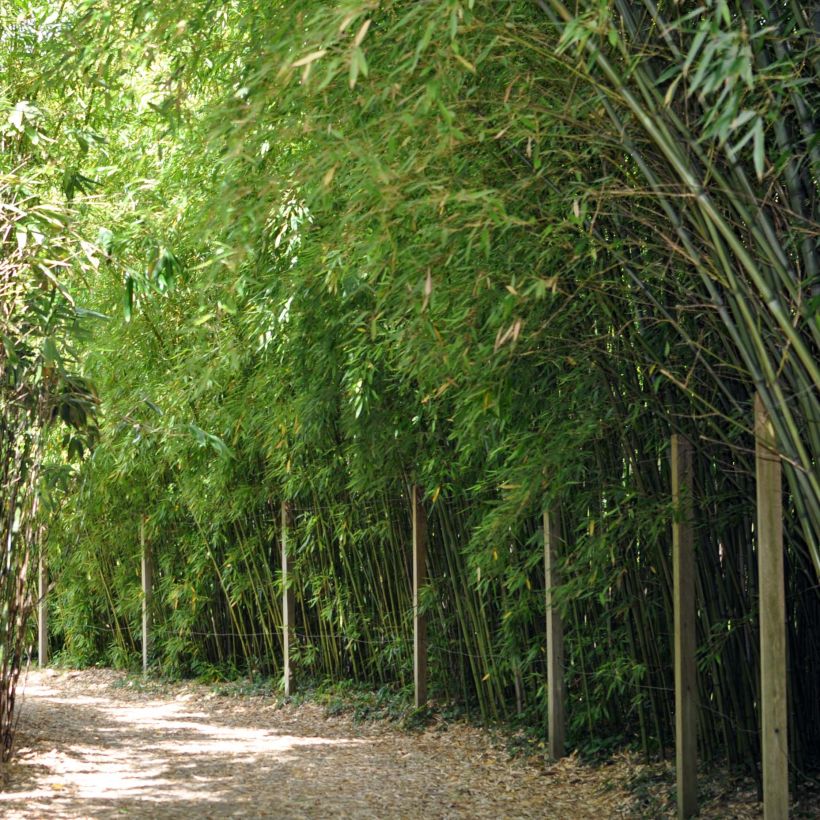

Plant habit
Foliage
Botanical data
Pleioblastus
chino
Gramineae
Dwarf Bamboo, Chino Bamboo
East Asia
Other Bamboos
Planting and care
Pleioblastus chino is a sun loving or partial shade bamboo, which requires a deep, fertile, moist, acidic to neutral soil that is definitely free of limestone. It should preferably be planted in late summer or autumn, or in spring. Highly spreading, it is advisable, when planting, to install a bamboo root barrier to limit its spread. Perfectly hardy, it can withstand temperatures as low as -24°C (1°F). In the ground, it does not tolerate drought, and even less so in a pot. For container cultivation, use well-draining soil and provide organic fertilizer twice a year to prevent leaf yellowing due to excess water and lack of nutrients. Propagation can be done through rhizome cuttings or clump division. This bamboo can be pruned every year in early spring to encourage the development of entirely new foliage or to give it a specific shape.
Planting period
Intended location
Care
This item has not been reviewed yet - be the first to leave a review about it.
Evergreen shrubs
Haven't found what you were looking for?
Hardiness is the lowest winter temperature a plant can endure without suffering serious damage or even dying. However, hardiness is affected by location (a sheltered area, such as a patio), protection (winter cover) and soil type (hardiness is improved by well-drained soil).

Photo Sharing Terms & Conditions
In order to encourage gardeners to interact and share their experiences, Promesse de fleurs offers various media enabling content to be uploaded onto its Site - in particular via the ‘Photo sharing’ module.
The User agrees to refrain from:
- Posting any content that is illegal, prejudicial, insulting, racist, inciteful to hatred, revisionist, contrary to public decency, that infringes on privacy or on the privacy rights of third parties, in particular the publicity rights of persons and goods, intellectual property rights, or the right to privacy.
- Submitting content on behalf of a third party;
- Impersonate the identity of a third party and/or publish any personal information about a third party;
In general, the User undertakes to refrain from any unethical behaviour.
All Content (in particular text, comments, files, images, photos, videos, creative works, etc.), which may be subject to property or intellectual property rights, image or other private rights, shall remain the property of the User, subject to the limited rights granted by the terms of the licence granted by Promesse de fleurs as stated below. Users are at liberty to publish or not to publish such Content on the Site, notably via the ‘Photo Sharing’ facility, and accept that this Content shall be made public and freely accessible, notably on the Internet.
Users further acknowledge, undertake to have ,and guarantee that they hold all necessary rights and permissions to publish such material on the Site, in particular with regard to the legislation in force pertaining to any privacy, property, intellectual property, image, or contractual rights, or rights of any other nature. By publishing such Content on the Site, Users acknowledge accepting full liability as publishers of the Content within the meaning of the law, and grant Promesse de fleurs, free of charge, an inclusive, worldwide licence for the said Content for the entire duration of its publication, including all reproduction, representation, up/downloading, displaying, performing, transmission, and storage rights.
Users also grant permission for their name to be linked to the Content and accept that this link may not always be made available.
By engaging in posting material, Users consent to their Content becoming automatically accessible on the Internet, in particular on other sites and/or blogs and/or web pages of the Promesse de fleurs site, including in particular social pages and the Promesse de fleurs catalogue.
Users may secure the removal of entrusted content free of charge by issuing a simple request via our contact form.
The flowering period indicated on our website applies to countries and regions located in USDA zone 8 (France, the United Kingdom, Ireland, the Netherlands, etc.)
It will vary according to where you live:
- In zones 9 to 10 (Italy, Spain, Greece, etc.), flowering will occur about 2 to 4 weeks earlier.
- In zones 6 to 7 (Germany, Poland, Slovenia, and lower mountainous regions), flowering will be delayed by 2 to 3 weeks.
- In zone 5 (Central Europe, Scandinavia), blooming will be delayed by 3 to 5 weeks.
In temperate climates, pruning of spring-flowering shrubs (forsythia, spireas, etc.) should be done just after flowering.
Pruning of summer-flowering shrubs (Indian Lilac, Perovskia, etc.) can be done in winter or spring.
In cold regions as well as with frost-sensitive plants, avoid pruning too early when severe frosts may still occur.
The planting period indicated on our website applies to countries and regions located in USDA zone 8 (France, United Kingdom, Ireland, Netherlands).
It will vary according to where you live:
- In Mediterranean zones (Marseille, Madrid, Milan, etc.), autumn and winter are the best planting periods.
- In continental zones (Strasbourg, Munich, Vienna, etc.), delay planting by 2 to 3 weeks in spring and bring it forward by 2 to 4 weeks in autumn.
- In mountainous regions (the Alps, Pyrenees, Carpathians, etc.), it is best to plant in late spring (May-June) or late summer (August-September).
The harvesting period indicated on our website applies to countries and regions in USDA zone 8 (France, England, Ireland, the Netherlands).
In colder areas (Scandinavia, Poland, Austria...) fruit and vegetable harvests are likely to be delayed by 3-4 weeks.
In warmer areas (Italy, Spain, Greece, etc.), harvesting will probably take place earlier, depending on weather conditions.
The sowing periods indicated on our website apply to countries and regions within USDA Zone 8 (France, UK, Ireland, Netherlands).
In colder areas (Scandinavia, Poland, Austria...), delay any outdoor sowing by 3-4 weeks, or sow under glass.
In warmer climes (Italy, Spain, Greece, etc.), bring outdoor sowing forward by a few weeks.

































